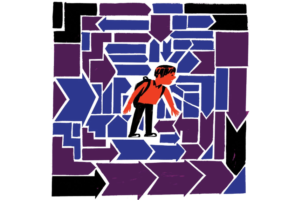From The New York Times: “According to the psychologist Peter Gray, children today are more depressed than they were during the Great Depression and more anxious than they were at the height of the Cold War. A 2019 study published in the Journal of Abnormal Psychology found that between 2009 and 2017, rates of depression rose by more than 60 percent among those ages 14 to 17, and 47 percent among those ages 12 to 13. This isn’t just a matter of increased diagnoses. The number of children and teenagers who were seen in emergency rooms with suicidal thoughts or having attempted suicide doubled between 2007 and 2015.
To put it simply, our kids are not O.K.
For a long time, as a mother and as a writer, I searched for a single culprit. Was it the screens? The food? The lack of fresh air and free time, the rise of the overscheduled, overprotected child, the overarching culture of anxiety and fear?
Those things might all contribute. But I’ve come to believe that the problems with children’s mental and emotional health are caused not by any single change in kids’ environment but by a fundamental shift in the way we view children and child-rearing, and the way this shift has transformed our schools, our neighborhoods and our relationships to one another and our communities.
The work of raising children, once seen as socially necessary labor benefiting the common good, is an isolated endeavor for all but the most well-off parents. Parents are entirely on their own when it comes to their offspring’s well-being. Many have had to prioritize physical safety and adult supervision over healthy emotional and social development.
No longer able to rely on communal structures for child care or allow children time alone, parents who need to work are forced to warehouse their youngsters for long stretches of time. School days are longer and more regimented. Kindergarten, which used to be focused on play, is now an academic training ground for the first grade. Young children are assigned homework even though numerous studies have found it harmful. STEM, standardized testing and active-shooter drills have largely replaced recess, leisurely lunches, art and music.
The role of school stress in mental distress is backed up by data on the timing of child suicide. ‘The suicide rate for children is twice what it is for children during months when school is in session than when it’s not in session,’ according to Dr. Gray. ‘That’s true for suicide completion, suicide attempts and suicidal ideation, whereas for adults, it’s higher in the summer.’ But the problems with kids’ mental and emotional health are not only caused by what goes on in the classroom. They also reflect what’s happening in our communities. The scarcity of resources of every kind, including but not limited to access to mental health services, health care, affordable housing and higher education, means that many parents are working longer and harder than ever. At the same time that more is demanded of parents, childhood free time and self-directed activities have become taboo.
And so for many children, when the school day is over, it hardly matters; the hours outside school are more like school than ever. Children spend afternoons, weekends and summers in aftercare and camps while their parents work. The areas where children once congregated for unstructured, unsupervised play are now often off limits. And so those who can afford it drive their children from one structured activity to another. Those who can’t keep them inside. Free play and childhood independence have become relics, insurance risks, at times criminal offenses.”












